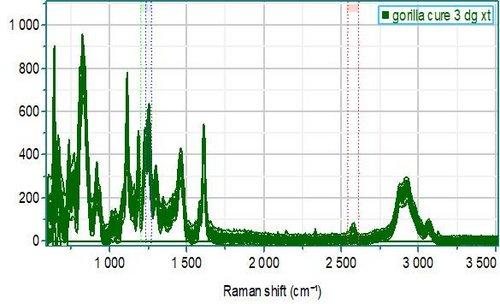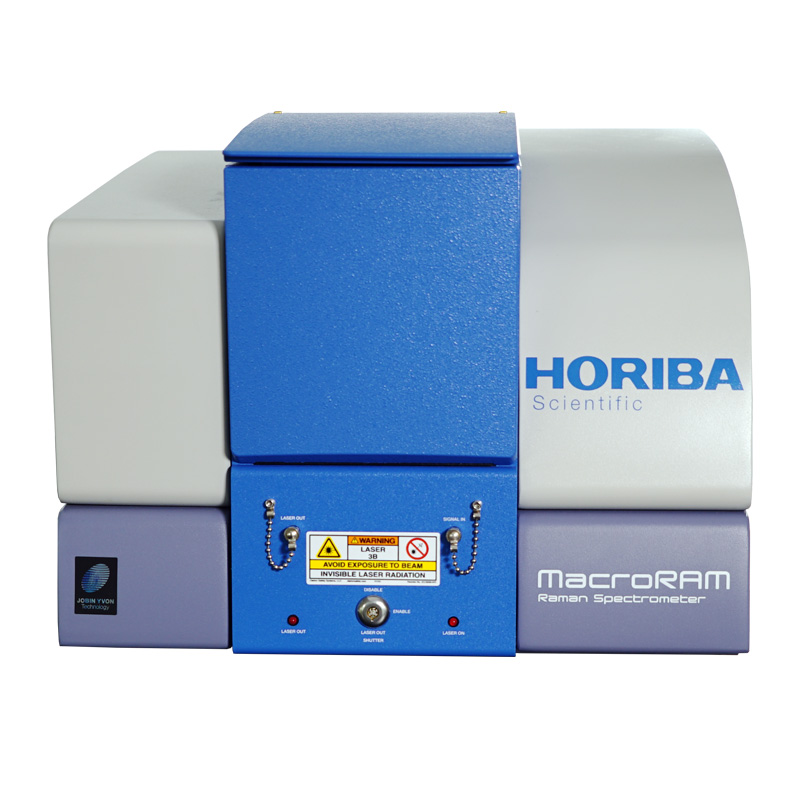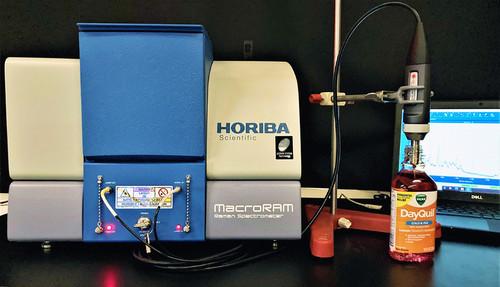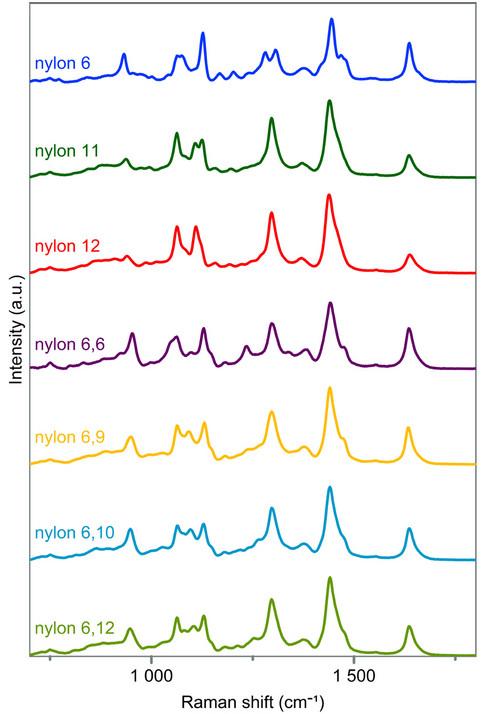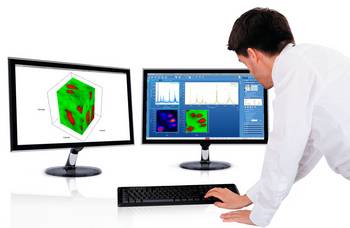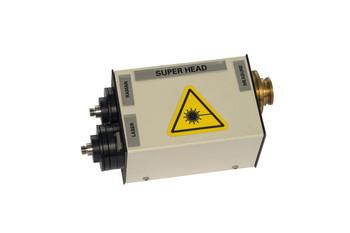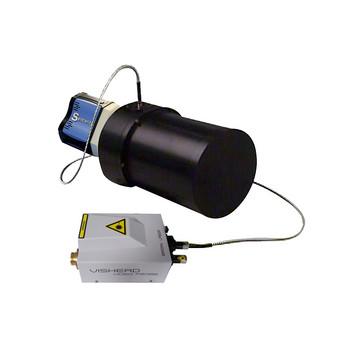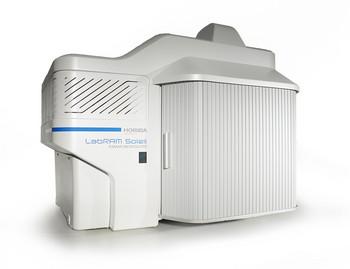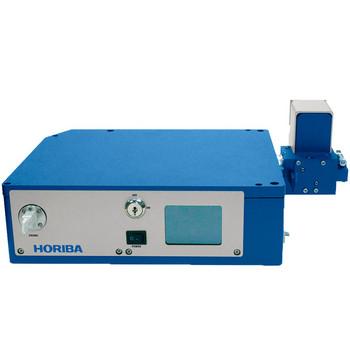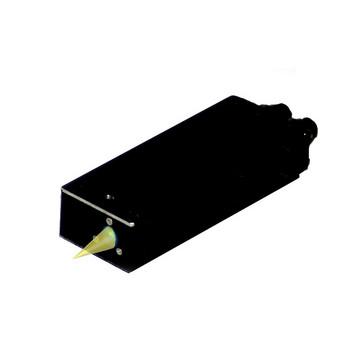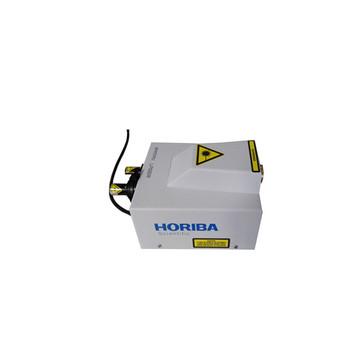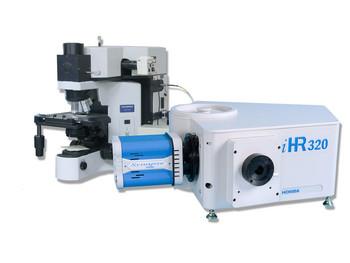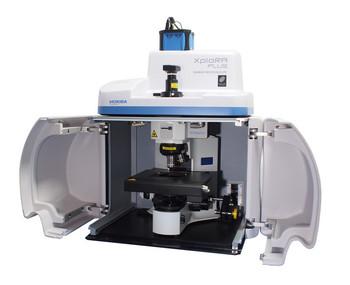Download this macro Raman spectroscopy poster to hang in your lab
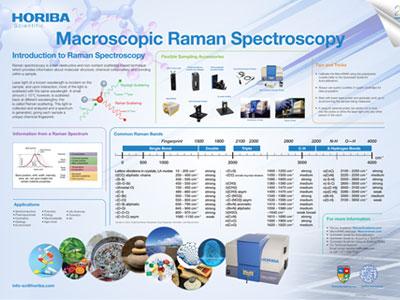
Featured Webinars

Industrial Applications for Macro-Raman Spectroscopy This webinar will focus specifically on Macro-Raman and the valuable information it can provide from identification/differentiation to quantification, to real-time process monitoring. | 
Applications in Macroscopic Raman Spectroscopy: From Industrial QC to Teaching Labs This webinar will provide a general overview of Raman spectroscopy and HORIBA Scientific's MacroRAM Raman spectrometer. Select applications examples and measurement demonstrations will be presented for pharmaceutical, microplastic and polymer samples. |
Featured Videos

MacroRAM Benchtop Raman Spectrometer Video | 
How To Set Up Your MacroRAM from HORIBA Scientific Video |

Spectroscopy in 60 Seconds - MacroRAM Accessories and Probes Video | 
Spectroscopy in 60 Seconds - KnowItAll HORIBA Edition Video |
Raman – it’s not just for experts anymore!
No one has more experience in designing and manufacturing high quality Raman systems than HORIBA Scientific, from modular Raman microscopes to triple Raman spectrometers. The MacroRAM extends HORIBA’s Raman offerings to a bench-top Raman spectrometer for macroscopic measurements. Using superior optical components and design, the MacroRAM is an easy-to-use, yet highly sensitive instrument for both routine and complex Raman measurements.
Features
Hardware
Laser
The MacroRAM uses a 785 nm diode-pumped solid-state laser, with tunable output power from 7 mW to 450 mW and full width half maximum of 0.1 nm. The power is controllable through LabSpec 6 software, scaling linearly from 0% (off) to 100% (full power). The laser source is filtered through a narrow bandpass filter before being focused onto the sample in the sample compartment. Raman signal is collected in the back scattered direction and filtered using an edge filter.
Spectrograph
The MacroRAM contains a fixed spectrograph for analysis of the resulting Raman signal. It is equipped with a 685 gr/mm holographic grating for superior stray light rejection. A spectrum is obtained by positioning a detector at the focal plane of the fixed spectrograph. The dispersion is 10.3 nm/mm and provides a resolution of 8 cm-1 at 914 nm.
Sample Compartment
The sample compartment positions the sample at the focal point of the detection optics for optimal coupling to the spectrograph and detector. A lens focuses light from the excitation laser to the sample, and the Raman signal is collected along the same path in a back-scattered Raman configuration directing the signal to the fixed spectrograph and detector. The sample compartment accommodates various optional accessories.
Detector
Each MacroRAM contains a multichannel CCD detector to record a full spectrum of the resulting Raman signal from the sample. It uses a back illuminated near-IR optimized Syncerity CCD cooled to -50°C for the highest available in-class sensitivity. The use of the Syncerity CCD with the MacroRAM’s fixed spectrograph provides 3300 cm-1 of total spectral coverage (100 cm-1 to 3400 cm-1). A correction file is stored to correct for wavelength dependencies of each optical component. The files are created at HORIBA Scientific for every instrument and are automatically applied to data through the LabSpec 6 software. Full details of the sensor can be found here.
External Probes
Each MacroRAM is equipped with the capability to connect an external probe for remote sample measurements. The excitation source is passed through the sample compartment to a fiber where it is coupled to the LASER OUT port on the MacroRAM. An FC/PC terminated fiber may then be connected from the LASER OUT port to an external probe. The returning signal can then be connected using an FC/PC terminated fiber to the SIGNAL IN port on the MacroRAM. An internal fiber then passes the signal to the fixed spectrograph and CCD detector for analysis of the Raman signal. An external interlock, key switch, and safety shutter ensure safe operation when the laser is used in an external configuration. To enable operation of the shutter, the key switch must be set to ENABLE.
The external interlock can be used to connect to any number of additional safety measures, for example, a door switch. The interlock is comprised of a two pin connector; continuity must be maintained between the two pins to enable laser output. If continuity is interrupted, the shutter will automatically close, blocking the laser output.
Software
LabSpec 6 Spectroscopy Software
The LabSpec 6 spectral software suite used on all the HORIBA Jobin Yvon analytical and research Raman spectrometer systems is now also available for modular Raman systems. It has been designed and written as a dedicated Raman spectroscopy package and offers many powerful capabilities not found in a basic spectroscopy software.
Accessories
HPLC Flow Cell
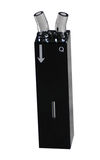
With a sample capacity of 20 μL, this non-fluorescing fused silica cell is ideal for on-line monitoring of Raman samples. The cell maintains high sensitivity because it has a large aperture for collecting the excitation light to the sample and spontaneous Raman emission from the sample. The flat sides allow maximum throughput while keeping the scattering of the incident radiation to a minimum. In order to use this cell, the user must also have the thermostatted cuvette holder.
Standard Quartz Cuvette
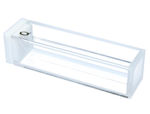
With a 4-mL volume, this cell measures 10 mm × 10 mm in cross-section, and comes with a Teflon® stopper to contain volatile liquids.
Reduced Volume Cuvette and Adapter
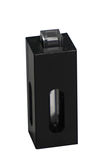
Reduced volume cuvettes are available in 250 µL or 500 µL volumes. Each reduced volume cuvette requires an adapter to fit properly into the standard cuvette holder.
Fused Silica Cuvette

This 2-mL to 4-mL non-fluorescing fused silica cell can accept a magnetic stirrer, has a 10-mm path length, and includes a white Teflon® cap that prevents sample evaporation.
Thermostatted Cuvette Holder
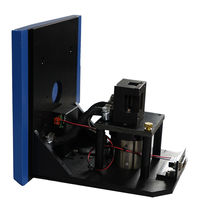
The Thermostatted Cuvette Holder keeps a sample at a constant temperature from -20°C to +80°C. From 5°C to +80°C the temperature is maintained with just water. Below 5°C the temperature is maintained by an ethylene glycol/water mixture pumped through an external circulating temperature bath (not included). The holder also includes a magnetic stirrer, enabling mixing of turbid or viscous samples. For temperature measurements, the user must supply their own or purchase the Temperature Bath.
Solid Sample Holder
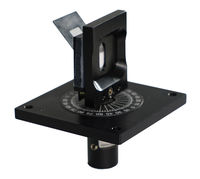
The Solid Sample Holder is designed for samples such as thin films, powders, pellets, microscope slides, and fibers. The holder consists of a base with a dial indicating angle of rotation, upon which a bracket, a spring clip, and a sample block rest. This holder comes standard with every MacroRAM.
Cuvette Holder
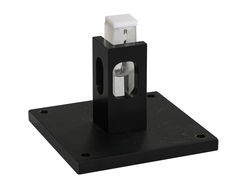
The Cuvette Holder is designed to hold standard 10 mm x 10 mm cuvettes for measurements of liquids. With additional adapters, reduced volume cuvettes or smaller cuvettes can also be placed in the Cuvette Holder. This holder comes standard with every MacroRAM.
SuperHead
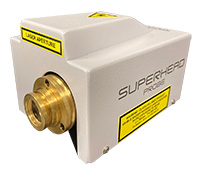
The SuperHead is a high efficiency remote Raman probe which enables in situ non-invasive chemical analysis to be undertaken. The purpose of the SuperHead is to efficiently deliver the laser beam to the sample material, and to collect and filter the returning Raman signal.
The SuperHead uses a single FC/PC terminated fiber for delivering the laser excitation and another FC/PC terminated fiber for signal collection. High efficiency filters incorporated within the probe provide effective laser and Raman filtering.
The SuperHead can perform measurements in a non-contact/non-invasive mode or in an immersion mode, using specific accessories.
Temperature Bath
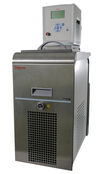
For studies of samples whose properties are temperature-dependent, use theTemperature Bath along with the Thermostatted Cuvette Holder (see above). The controller circulates fluids externally, with tubes leading to the sample chamber. The temperature range is from –20°C to +80°C. Sensor and all cables are included with the Temperature Bath and it is available in a 110V and 220V version.
External Probes
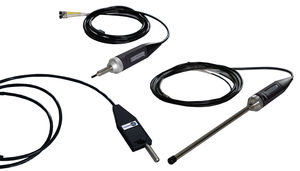
Various external immersion and touch probes are available to add to the MacroRAM. External probes can be easily connected to the MacroRAM for measurements outside of the sample compartment to accommodate larger or irregularly shaped samples.
